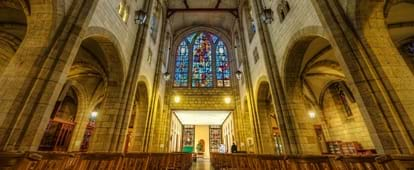By creating an account, I agree to the
Terms of service and Privacy policy
Choose your country and language:
Africa
Americas
Asia Pacific
Europe
SSouth African English culture has been one of the defining elements in shaping our Rainbow Nation. The first immigrants arrived in 1820 and established Eastern Cape towns like Port Elizabeth and Grahamstown (since renamed Makhanda).
South African English culture began with the second British occupation of the Cape in 1806, and especially with the start of mass immigration from Britain in 1820.
The Great Fish River of Eastern Cape, in the early 19th century, was the turbulent eastern frontier of the Cape Colony. Beyond it were the Xhosa peoples, resentful of having to compete for space.
In 1812, to stop incursions across the river, Lieutenant Colonel John Graham was instructed to establish a camp. He chose a spot in a valley of the Dwarsberg mountains in the Albany District.
The tented military camp there soon attracted frontier people keen for protection. But troubles intensified, culminating in the attack on what had come to be known as Grahamstown by the mystic Makhanda on 22 April 1819.
Cape Governor Lord Charles Somerset decided to call for Britain to send emigrants to bolster the defences of the colony. Farms and transport were offered for the nearly 4 000 people selected, who arrived during April 1820 and became known as the 1820 Settlers. These people introduced English culture to South Africa, spreading it to the rest of the country as they dispersed.

TThey also brought with them their English beliefs, mainly rooted in the Anglican Church. With them came missionaries who worked among many of the indigenous peoples of South Africa, often siding with their plight. This led to upheavals, among these the Great Trek exodus from the Cape.
The British introduced the first newspapers and played a role in the country's development into an economic powerhouse. English is now spoken throughout the country, and some of South Africa's finest literature − including the novels written by Nobel Prize winners Nadine Gordimer and JM Coetzee − is written in English.
The most cataclysmic series of events involving the British in South Africa was when the Boer Republics went to war against Britain in 1899 in what was to be known as the South African (Anglo-Boer) War. There was great loss of life, not only of Boer and British, but also among the ranks of the indigenous Africans who supported either side.
After three years of bitter fighting, the Treaty of Vereeniging was signed. The Boer forces capitulated.
To commemorate the arrival of the English, a living memorial, the 1820 Settlers Monument, was built overlooking Makhanda in 1974. The annual National Arts Festival in the city, which initially celebrated the English language almost exclusively, has now become all-inclusive.
TTravel tips & Planning info
Who to contact
National English Literary Museum (Makhanda)
Tel +27 (0)46 622 7042
Grahamstown Foundation
Tel: +27 (0)46-6031100
Email: admin@foundation.org.za
Related Links
PPlanning a trip to South Africa? Meet Your South Africa guides, the people that know the country best! Read the Meet Your South Africa magazine here
__________________________________________________________________________________
For inspiration and insider tips, follow us on Instagram, Facebook, or Twitter. Tag #MeetSouthAfrica to share your pics with us, or subscribe to our newsletter for latest information, great holiday offers, prizes and consumer events across South Africa.
Related articles

|Terms and conditions|Disclaimer|Privacy policy|Social Media Terms and Conditions|Competition Terms and Conditions
